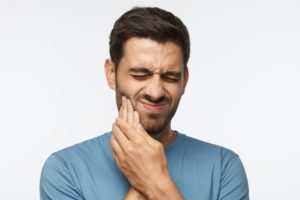 At Dental Distinction, we provide comprehensive dental services to Chester Springs, PA, and surrounding communities. Dr. Jason Petkevis regularly sees patients suffering from the painful symptoms of TMJ disorders including jaw pain and tension headaches. As a Dawson dentist, Dr. Petkevis has devoted a significant portion of his post-graduate training towards bite problems and TMJ-related issues. He can help you overcome your jaw pain with TMJ therapy. If you are suffering from jaw pain and frequent tension headaches, learn the answers to frequently asked questions regarding TMJ disorders below:
At Dental Distinction, we provide comprehensive dental services to Chester Springs, PA, and surrounding communities. Dr. Jason Petkevis regularly sees patients suffering from the painful symptoms of TMJ disorders including jaw pain and tension headaches. As a Dawson dentist, Dr. Petkevis has devoted a significant portion of his post-graduate training towards bite problems and TMJ-related issues. He can help you overcome your jaw pain with TMJ therapy. If you are suffering from jaw pain and frequent tension headaches, learn the answers to frequently asked questions regarding TMJ disorders below:
Why does my jaw hurt?
Often, jaw pain can be traced back to an underlying dental concern that needs to be addressed. If you have a missing tooth, damaged tooth, crooked teeth, or any other dental concern affecting your bite’s overall alignment, this is often the cause of jaw pain. Your teeth are designed to work together when performing daily tasks like chewing or speaking. Any dental concern that makes it more difficult for you to chew or speak properly applies additional strain to your facial muscles and jaw joints and is likely to cause jaw pain. You should have your jaw pain evaluated by an experienced restorative dentist like Dr. Jason Petkevis.
Does bruxism cause jaw pain?
Bruxism, also known as teeth grinding, is one of the main symptoms of patients suffering from TMJ-related jaw pain. If you have a history of teeth grinding, you are more likely to develop a TMJ disorder. When you grind your teeth together, you are holding a lot of tension in your jawbone and rubbing your teeth together in a way that can damage the denton. The more often you grind your teeth, the more noticeable symptoms may be. Worn down teeth are a symptom of bruxism in addition to waking up with tension headaches, a sore jaw, or sensitive teeth. If you suspect you’ve been grinding your teeth together, talk to your Chester Springs dentist about your treatment options to prevent future dental concerns.
What is a TMJ disorder?
A TMJ disorder is when the temporomandibular joint of your jaw becomes damaged or inflamed. This is the main joint that is utilized when you are chewing or speaking. Patients with TMJ disorders often suffer from jaw pain, tension headaches, earaches, and other pain in the muscles in the face, neck, and shoulders. The more tension that is placed on this joint, the more likely it is to become inflamed or damaged. If you have a history of jaw clenching or teeth grinding, you’ll need to be diagnosed by a professional dentist to determine the best treatment option for your TMJ disorder.
How is TMJ treated?
TMJ disorders are treated by addressing the underlying dental concerns causing the pain and discomfort. If a patient’s bite is misaligned because they have crooked teeth, orthodontic work can resolve the added tension in your face and jaw. If a patient is missing one or more teeth, tooth replacement options should be considered for restoring the balance of the bite. If a history of jaw cleaning or teeth grinding is determined to be the cause of a TMJ disorder, TMJ mouthguards can help relieve the pressure around the joints and prevent dental damages.
If you would like to learn more about TMJ disorders, please schedule an appointment with Dr. Petkevis. We look forward to helping you restore your smile and your peace of mind.
